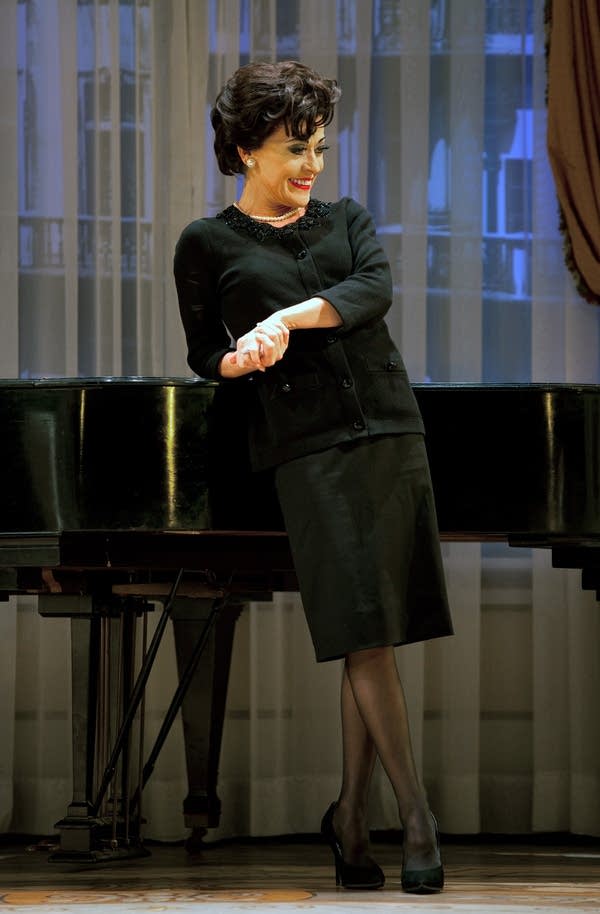Actress channels Judy Garland at 'End of the Rainbow'
Go Deeper.
Create an account or log in to save stories.
Like this?
Thanks for liking this story! We have added it to a list of your favorite stories.

Judy Garland returns to the state of her birth this week, or at least a play about her calamitous final days.
"End of the Rainbow" was a well-received hit in London's West End, and it now opens at the Guthrie Theater before moving to Broadway. The play depicts the events of Garland's concert engagement in London three months before her death of an overdose. British actor Tracie Bennett, the original star in London, now plays Garland at the Guthrie.
Tracie Bennett is tiny, but singing as Judy Garland, she can fill the entire Guthrie stage. Upon meeting the actress in her Guthrie dressing room, it takes a moment to recognize Bennett as the same person who embodies Garland in 'End of the Rainbow.' For one thing Bennett is blond, and as a native of northern England her speaking voice is very different from the one she adopts for her character'. She speaks of Garland in awed tones.
"She's a legend," Bennett said. "She's an icon."
Turn Up Your Support
MPR News helps you turn down the noise and build shared understanding. Turn up your support for this public resource and keep trusted journalism accessible to all.
Born Frances Gumm in Grand Rapids, Minn., in 1922, Judy Garland was America's fresh-faced girl next door. But by 1969 she was deeply troubled. Exhausted, broke, and dependant on prescription drugs she arrived in London for a five-week engagement at the Talk of the Town theater. In preparing for the role Bennett read voraciously.
"I started off not thinking about Judy Garland, if that's possible. I started off thinking 'This is a human being' and 'what has this person been through?' You just layer upon layer upon layer," Bennett said. "The human being, the woman, the background. The parents' background, the career, where she's from. Where she went to. Frances Gumm to Judy Garland. What does that do to a person?"
In Garland's case, it produced a highly complicated artist who is at once powerful, and helpless, loving and enraged, hilarious and pathetic, sweet and foulmouthed, who at times dreads going on stage but needs the adoration of an audience, Tracie Bennett said. It is a tough role to play.

"This is like riding a stallion," she said. "And you have to get on that horse and pull it back and let it gallop, and make it trot and make it jump," Bennett said. "And help the horse to help you, to understand the horse to help you. The piece helps me with that. And that's what I like the challenge of, to hit those targets every night. It's mental Olympics. It is."
Ultimately, "End of the Rainbow" is about the price of fame, Bennett said. In the play, Garland argues with her new fiance, Mickey Deans, and her music director, Anthony, about giving her pills so she can perform. Both want to protect her, but they need her to get through the concerts. Bennett has been struck by the way audience members sometimes feel guilty, as well.
"I didn't think of that at first," she said. "And then you start thinking you know the mirrors at the back of the stage are reflecting the audience and people have said to me, 'It's really weird, but we are sitting there thinking we have done it to her.' "
Bennett said she has also been approached by alcoholics who said seeing Garland battle her demons in the show kept them sober.
"End of the Rainbow" is at the Guthrie for a six-week run before moving to Broadway. Opening the production near Judy Garland's birthplace is very special, Bennett said.
"I'm thrilled to be here, and it's an honor, and I feel like crying every day and don't set me off," Bennett said. "I do, I can't honestly believe it, because I was a chorus girl. I skip to work, literally. I skip to work."
For Judy Garland the end of the rainbow was tragic, but for Tracie Bennett it represents a dream coming true.






